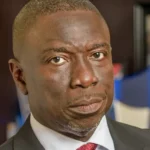I have often heard that politics in Nigeria is a game of ‘numbers’.
For anyone who needs to understand what that metaphor stands for, they should know that democracy is a game buoyed by the number of people who believe in and accept the manifesto of a popular candidate. It makes ‘majority carry the vote’.
In the days of the evil genius when and where the option A4 was the preferred pattern of voting, all you need to know who has won an election would be to look at the long line of those standing behind a preferred and popular candidate of choice.
Till today, we are yet to fully come to terms with why this kind of pattern of voting that eloquently defined the idea of number, and its ramifications in the democratic cum voting process is now preferred.
To be the preferred candidate, politicians often set out an agenda that speaks to the hopes, yearnings and aspirations of their supporters. A classic example would be the June 12 1993 elections.
The two candidates MKO Abiola and Bashir Tofa of the SDP and NRC respectively campaigned spiritedly, and set the civil space afire with the kind of jingles and slogans that nearly became anthems in their own right.
But at the end of the day, one candidate took the election, because of the sheer number of people who lined up against that candidate’s party logo and name.
But the Chris Ngige and Chris Uba affair of 2003 changed all that. By that year, Nigerians suddenly woke up to a ‘contract’ signed between Chris Ngige and his godfather Chris Uba.
By the terms of that ‘contract’, Ngige ‘promised in writing to exercise and manifest absolute loyalty to the person of Chief Chris Uba as his mentor, benefactor and sponsor. He also agreed to allow Uba control all important government appointments and the awarding of contracts.
Part of the contract between the two Chrises gave the one power to ‘avenge himself in any way and manner adjudged by him as fitting and adequate’.
In July of that year, Chris Ngige reneged on that agreement, and what was to happen reordered the political DNA of all elections in Nigeria.
The governor, Chris Ngige was kidnapped by policemen and made to sign a letter of resignation at gunpoint.
Not only Chris Ngige, but all the members of Anambra state house of Assembly allegedly took the same oath which was allegedly administered in an ‘evil’ forest in Okija.
They all quickly ratified the governor’s resignation. Even though the courts repudiated the purported ‘resignation’, of Chris Ngige, what again happened in 2004 – the attack and burning to the ground, of half of government house Awka – effectively replaced the power of number in the people, to power of an individual with bags of money.
These days, this individual, aka godfather ‘anoints’, ‘sponsors’ or single-handedly selects who governs, legislates or even who serves at the bench. Democracy in Nigeria therefore is no longer a game of number but a game of thrones, and of who has the most control of money.
The idea of numbers got lost to the superior power of a godfather to ‘sponsor’ a candidate or candidates, whose allegiance shifted from the people to the sponsor of a candidate.
The idea of number is no longer of the people but an idea of numbers in money. Votes no longer count, that is in spite of the numbers of billions being spent by INEC to promote the one-man-one-vote lie.
Sponsorship of candidates by a godfather has nothing to do with you or I or our children. Sponsorship of any candidate is in the interest of the godfather. The godfather gathers a group of like-minded individuals together to ‘work’ for the ‘election’ of the individual of their choice.
What ‘work’ means is usually the employment of all and any means necessary to subvert the popular will. What ‘work’ means is the distribution of monies to very many interest groups to buy PVCs and votes.
‘Work’ is not the physical engagement of the ‘workers’ with the people in presenting party programmes and projects. ‘Work’ is spending money and vast amounts of it to buy the instruments and systems which promote the subversion of democracy.
And after the individual eventually gets elected, he uses money for hospitals, roads, schools, decent markets, rural development to settle the investments by the godfather and his cohorts.
There is a very well-known incident that took place during the administration of one of the governors in Edo.
The long and short of the story is that contract for the tarring of a road ended up in the pocket of one of those who ‘worked’ for the governor.
When apprehended by the governor, party instruments insisted that since the chap in question ‘worked’ to get the governor elected, those monies for the road construction effectively became monies for the ‘work’ the party man put in to get the governor elected.
Today, the road is untarred, five years after.
That is the tragedy of what democracy has become in Nigeria. Nearly every politician in Nigeria today has a godfather who has sponsored him, and ‘worked’ for his/her election. And a very good example of how this aberration has become entrenched in our political lives is the Edo debacle. Edo is Anambra in all ramifications.
A certain godfather who himself rubbished Edo godfathers, handpicked his successor, and against all remonstrations from his lieutenants. Along the way, he found out that his protégé was no longer ready to abide by the rules of their engagement.
The protégé allegedly refuses to ‘share’ public monies among those who ‘worked’ to get him in as governor. And therefore he is an ‘ingrate’, biting at the very fingers that ‘helped’ him to get to power.
There is nothing wrong in giving party people whatever dues they deserve for their ‘work’. Those involved should work the numbers or monies out among themselves rather than seeking to line their pockets with public funds.
The perspective of ‘work’ today is not the same with ‘working’ to get fit persons into positions of public office, but in getting the unfit to do the bidding of a godfather and his sycophants, and perpetuate mediocrity.
Therefore, in the current redefinition of the concept of ‘numbers’ in Edo politics, its people are, and will be the greatest losers. And perhaps, what amounts to the greatest blunder is the position of the pseudo-elite: in that in determining the broader outcomes of the governorship elections of September 19 2020, they are the ones vigorously pursuing the new definition of numbers, not the old. A huge shame.
By Bob MajiriOghene Etemiku who is deputy executive director, Civil Empowerment & Rule of Law, CERLSI, Benin City.

 Join Daily Trust WhatsApp Community For Quick Access To News and Happenings Around You.
Join Daily Trust WhatsApp Community For Quick Access To News and Happenings Around You.


